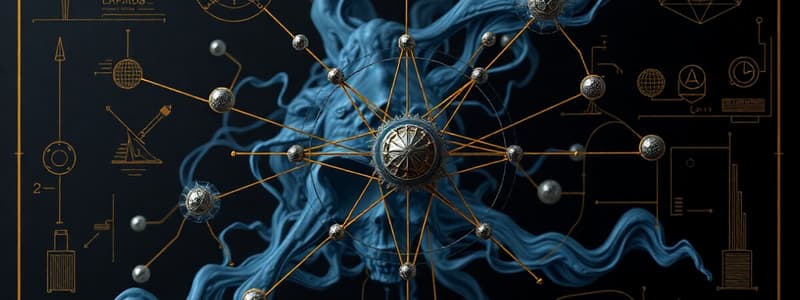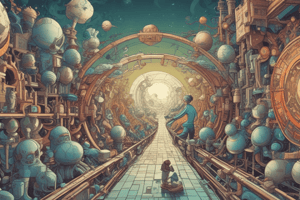Podcast
Questions and Answers
Which of the following best characterizes Lakatos' view on the relationship between the history and philosophy of science?
Which of the following best characterizes Lakatos' view on the relationship between the history and philosophy of science?
- The history and philosophy of science should engage in a critical dialogue, where rational reconstructions serve as models for understanding scientific development. (correct)
- The history and philosophy of science are independent and should not influence each other.
- The history of science should primarily focus on abstract reconstructions of scientific methods.
- The philosophy of science should be entirely based on empirical observations from the history of science.
In Lakatos' methodology of scientific research programs, what distinguishes a progressive program from a degenerating one?
In Lakatos' methodology of scientific research programs, what distinguishes a progressive program from a degenerating one?
- A progressive program generates novel predictions and explanations, while a degenerating one only explains existing data after the fact. (correct)
- A progressive program relies solely on established methodologies, while a degenerating one explores new approaches.
- A progressive program readily abandons its hard core in the face of falsifying evidence.
- A progressive program consistently corroborates its core theories through empirical evidence.
According to Mieke Boon, what is the epistemological function of technological instruments in scientific practice?
According to Mieke Boon, what is the epistemological function of technological instruments in scientific practice?
- To develop and test scientific theories. (correct)
- To serve as neutral tools for objective observation.
- To apply scientific theories in practical applications.
- To confirm existing theories by gathering empirical data.
What does Boon mean by advocating for a 'phenomenon-oriented' perspective in the philosophy of science?
What does Boon mean by advocating for a 'phenomenon-oriented' perspective in the philosophy of science?
What is implied by the statement that experiments 'have a life of their own,' as argued by the New Experimentalism?
What is implied by the statement that experiments 'have a life of their own,' as argued by the New Experimentalism?
Which of the following reflects Deborah Mayo's view on the role of errors in scientific experimentation?
Which of the following reflects Deborah Mayo's view on the role of errors in scientific experimentation?
What is meant by the 'theory-ladenness' of instruments, as discussed by Boon, and how does Hasok Chang address this issue?
What is meant by the 'theory-ladenness' of instruments, as discussed by Boon, and how does Hasok Chang address this issue?
What are the two roles of instruments?
What are the two roles of instruments?
What does Hooker's microscope illustrate?
What does Hooker's microscope illustrate?
What does 'self-vindication of lab science' mean??
What does 'self-vindication of lab science' mean??
How does Cartwright's 'nomological machine' connect abstract and real elements?
How does Cartwright's 'nomological machine' connect abstract and real elements?
According to Kitcher, what is the central aim of science in 'Explanatory Unification'?
According to Kitcher, what is the central aim of science in 'Explanatory Unification'?
What does Kitcher mean by 'explanatory store,' and how is it evaluated?
What does Kitcher mean by 'explanatory store,' and how is it evaluated?
According to Kitcher, what criteria should guide scientific research priorities?
According to Kitcher, what criteria should guide scientific research priorities?
What is Kitcher's main concern regarding the traditional distinction between 'pure' and 'applied' science?
What is Kitcher's main concern regarding the traditional distinction between 'pure' and 'applied' science?
According to Longino, why is community diversity important for objectivity?
According to Longino, why is community diversity important for objectivity?
What is the role of knowledge production?
What is the role of knowledge production?
How does Longino suggest feminists engage with values?
How does Longino suggest feminists engage with values?
What is the goal of Longino's thesis?
What is the goal of Longino's thesis?
What alternative do Borsboom, Cramer, and Kalis offer to explanatory reductionism?
What alternative do Borsboom, Cramer, and Kalis offer to explanatory reductionism?
Why do Borsboom et al believe the complexities cause mental disorders to not be reduced to biological causes?
Why do Borsboom et al believe the complexities cause mental disorders to not be reduced to biological causes?
What is the relationship between intentionality and mental conditions?
What is the relationship between intentionality and mental conditions?
Why do the authors view the biologization of institutions like NIMH, as too simple?
Why do the authors view the biologization of institutions like NIMH, as too simple?
Why is correlation not enough?
Why is correlation not enough?
What occurs from a 'brain disorder' label?
What occurs from a 'brain disorder' label?
In Kendler Zachar and Cravers' analysis on the kinds of things that psychological disorders are what kind of features do essentailistic categories lack?
In Kendler Zachar and Cravers' analysis on the kinds of things that psychological disorders are what kind of features do essentailistic categories lack?
According to practical kinds, what should the DSM be?
According to practical kinds, what should the DSM be?
MPC(mechanistic property clusters)
MPC(mechanistic property clusters)
According to Van Fraassen, what is the central tenet of scientific realism that he opposes?
According to Van Fraassen, what is the central tenet of scientific realism that he opposes?
According to Van Fraassen, what does acceptance of a theory entail?
According to Van Fraassen, what does acceptance of a theory entail?
In what aspects is one skeptical regarding looking a microscope or something man made?
In what aspects is one skeptical regarding looking a microscope or something man made?
Why trust micro images??
Why trust micro images??
How can you know something exists without theory?
How can you know something exists without theory?
How does Hacking define a good phenomenon?
How does Hacking define a good phenomenon?
What does it mean to be intervention-realist?
What does it mean to be intervention-realist?
According to Hacking, what is the 'looping effect' in the context of classifying people?
According to Hacking, what is the 'looping effect' in the context of classifying people?
According to Khalifa why have social constructs been criticized?
According to Khalifa why have social constructs been criticized?
Why should constructivism have force?
Why should constructivism have force?
What element is it critical that the explanation is realistic and plausible?
What element is it critical that the explanation is realistic and plausible?
According to LaPorte, why do the limits of natural kinds not get discovered?
According to LaPorte, why do the limits of natural kinds not get discovered?
What can Jade tell us?
What can Jade tell us?
What is one quality of the Galilean Ideal?
What is one quality of the Galilean Ideal?
Flashcards
Rational Reconstruction
Rational Reconstruction
Abstract description of how science should proceed logically and systematically.
Methodological Norms
Methodological Norms
Norms for presenting reconstructions independent of actual scientific history.
Methodologically Oriented History
Methodologically Oriented History
Using rational reconstructions to understand why theories were accepted or rejected.
Methodological Falsificationism
Methodological Falsificationism
Signup and view all the flashcards
Research Programs
Research Programs
Signup and view all the flashcards
Progressive Research Program
Progressive Research Program
Signup and view all the flashcards
Degenerative Research Program
Degenerative Research Program
Signup and view all the flashcards
Internal Historiography
Internal Historiography
Signup and view all the flashcards
External Historiography
External Historiography
Signup and view all the flashcards
Inductivist Methodology
Inductivist Methodology
Signup and view all the flashcards
Conventionalistic Methodology
Conventionalistic Methodology
Signup and view all the flashcards
Falsificationist Methodology
Falsificationist Methodology
Signup and view all the flashcards
Research Program
Research Program
Signup and view all the flashcards
Boon's Philosophy
Boon's Philosophy
Signup and view all the flashcards
Functions of Instruments
Functions of Instruments
Signup and view all the flashcards
Reproducing phenomena
Reproducing phenomena
Signup and view all the flashcards
New Experimentalism
New Experimentalism
Signup and view all the flashcards
Instrument Theory laden
Instrument Theory laden
Signup and view all the flashcards
Coherent Epistemology
Coherent Epistemology
Signup and view all the flashcards
Phenomenon-oriented View
Phenomenon-oriented View
Signup and view all the flashcards
Role of instrument
Role of instrument
Signup and view all the flashcards
Instrument
Instrument
Signup and view all the flashcards
Two kind of science
Two kind of science
Signup and view all the flashcards
Laboratory Self-vindiction
Laboratory Self-vindiction
Signup and view all the flashcards
Nomological machine
Nomological machine
Signup and view all the flashcards
Meetinstruments
Meetinstruments
Signup and view all the flashcards
Exploratieve instrumenten
Exploratieve instrumenten
Signup and view all the flashcards
Thermometer
Thermometer
Signup and view all the flashcards
Kitcher's Herformulering
Kitcher's Herformulering
Signup and view all the flashcards
The Explanatory store
The Explanatory store
Signup and view all the flashcards
The model needs
The model needs
Signup and view all the flashcards
Explanation by pattern
Explanation by pattern
Signup and view all the flashcards
Argument
Argument
Signup and view all the flashcards
New understanding.
New understanding.
Signup and view all the flashcards
Lose explanatory model
Lose explanatory model
Signup and view all the flashcards
Problems
Problems
Signup and view all the flashcards
Who gets govern?
Who gets govern?
Signup and view all the flashcards
Tempt distinction
Tempt distinction
Signup and view all the flashcards
Objective vs social
Objective vs social
Signup and view all the flashcards
A promise
A promise
Signup and view all the flashcards
Study Notes
Lakatos
- Imre Lakatos aimed to connect the history and philosophy of science, advocating for their collaboration
- He criticized historical accounts that only gather facts and philosophical approaches that pursue abstract reconstructions of scientific methods
- Lakatos placed rational reconstructions in a central role to bridge the gap
Rational Reconstructions
- Rational reconstruction illustrates how science logically, systematically, and consistently should ideally progress
- Inductivism, where observations build science, and Karl Popper's falsificationism, where theories grow by refuting attempts, are classical examples
- Reconstructions are not descriptive; they are normative and advocate for quality science
- Philosophers tend to present reconstructions as methodological norms, disconnected from science's actual historical progression
- Science historians often describe the actual messy procedures, including social, psychological and political elements
- Combining these approaches represents a core task
Theory and Practice Discrepancy
- A tension exists between scientists' "by the book" approach through rational reconstruction and their practical actions
- A good reconstruction can become a benchmark to assess scientific advancement, despite any reality deviations
- A comparison can be made to the usefulness of ideal gas laws in physics
Methodology as Reconstructive History
- Science history should be written as "methodologically oriented history"
- Rational reconstructions are employed to understand theory acceptance or rejection
- Multiple reconstructions can exist for one historical period
- Reconstructions get tested against historical facts to explain scientific behavior
Lakatos' Program
- Methodological falsificationism incorporates historical insights with Popper's falsification idea
- Theories get assessed inside research programs with a "hard core" and a protective belt of auxiliary hypotheses
- Progress happens via a rational process instead of immediately rejecting theories through falsification
- The progress can be progressive, meaning successful in predicting and explaining, or degenerative, that is explaining afterward
Dialogue Advocacy
- Lakatos advocated for integrating science's history and philosophy
- Rational reconstructions act as testable explanation models for scientific development
- Science theory should not be separate from history. Instead, it should critically reconstruct and evaluate it from a normative viewpoint
Internal Vs External Historiography
- Internal historiography describes science through the lens of rational reconstructions like logical steps, theories, and methodologies
- External historiography explains science using psychological, sociological, or political factors
Methodologies
- Inductivist methodology involves science advancing by gathering observations and deducing general laws
- Conventionalist methodology involves science maintaining scientific theories by using ad-hoc adjustments to counter evidence
- Falsificationist methodology involves theories that can make risky predictions, and get rejected if falsified
Kuhn Critique
- Lakatos considered Kuhn's paradigm shifts irrational and too dependent on social factors
Research Program
- Research programs are coherent sets of theories
- It is progressive if the new predictions are successful, and regressive if it only explains what's already known
Popper Criticism
- Falsification is a meta-criterion inside research programs
- Programs get compared regarding progression instead of assessing individual theories
Boon
- Technological instruments have a vital, yet frequently philosophically overlooked, function in scientific practice
- Technological instruments serve two functions: to develop and test scientific theories, they fulfill an epistemological function, and to produce relevant physical phenomena. -They fulfill a material function
Phenomenon-Oriented Perspective
- Boon advocates for a phenomenon-oriented perspective because of the traditional theory-oriented approach where science's material side previously received limited attention
Hooke's Law
- Hooke's law of elasticity and the discovery of super conduction in mercury illustrates this concept
- It’s important to not only understand phenomena; it’s also necessary to develop technology to reproduce and manipulate it
- Instrument development and phenomena understanding are therefore interconnected
Philosophy of Science
- A traditional positivist view sees science as focusing on actual theories where experiments simply provide data to confirm or deny them
- Experiments are theory-dependent and that observations get shaped by instruments and the theories used
- A new movement regarding philosophy of science emerged as a result, known as "New Experimentalism"
New Experimentalism
- Thinkers like Ian Hacking, Nancy Cartwright, and Allan Franklin focused on how experiments function
- Experiments produce phenomena and are not confined to simply testing theories even if these new phenomena lack theoretical explanation
- It's important to manipulate the world using instruments, since experiments "have a life of their own"
Underdetermination Topic
- Boon delves into how scientists address errors in experiments and underdetermination, which is when theories describe data; Deborah Mayo held errors as imperative for learning and amending while hypotheses undergo testing at different levels
Theory-Ladenness Topic
- Theory-ladenness is when instruments are constructed and interpreted in reliance with certain theories
- Hasok Chang showed that knowledge, theory, and instruments developed concurrently
Phenomenon-Oriented Perspective
- It is important to focus on how concepts become useful, and when they are most useful, rather than when they are "true"
Instrument Roles
- Instruments unearth new occurrences and enable to make possible
- Instruments have the ability to assist observation while actively contribute amid experiments
Science Technology Roles
- It is important to study technology. It is a knowledge practice when used as an integral component to produce scientific insights
Material Instruments
- Hooke's microscope brought cells into focus and originated to originate “cell visibility”
Theory & Phenomenon Orientation Comparison
- The former provides modeling explanation, while the approach concentrates to comprehend observed patterns in work
Positivist Scientific Theories
- Knowledge emerged through observation and logic like Carnap
- Devices are viewed neutral due to this, as active components
Underdetermination Duhem Quine Problem
- Cannot test a theory just from isolation, because results rely on other hypotheses, and this affect direct test
New Experimentalism
- Experimental practices are emphasized instead of objective viewpoints due to under determination
Replacing Common Attitudes
- Manipulations in the world replace impartial assessments. Theories and assessment are irrelevant
Inter v External Benchmark
- Standardized ways are the reasons behind research, with tech playing large roles
Theory's Life & Influence
- Quantum theory had a major impact when it came to being autonomus and abstract with chip tech
Measurements
- Combined methods are necessary to improve the robust/ strength
Intervention & Depiction
- Depiction describes and empirical information spreads through interventions
Laboratoty
- Proof through labs is useful for implementation
Cartwright's Machine
- Controlled mechanisms have the potential to reproduce connections, uniting abstractness, in real life
Classes of Instrumentation
- Instruments to asses data and new phenomenas
Casus thermometer
- Thermometers yield data from experiences while strengthening/ creating these values
Kitcher : Explanatory Unification
- Philip Kitcher critiqued the standard "covering law model" of scientific explanation, stating that it was narrow
- Kitcher thought the traditional covering law model was generous, because he thought they do not deepen our insight. Reverse of irrelevant information is permitted, and we would be in capable of knowing which explanation enhanced cognitive function
Kitcher Model
- Uni cation stems with reduction, and patterns are used on numerous appearances that offer individual notions
- Scientific theories give understanding on an underlying structure with small independent guesses
Model Illustration
- Issac Newton used it in theoretical and applied physics, and Darwin also added it to his work
- Darwin provided a new lens to biological assessments, linking past observations to modern information
Kitcher Idea
- The explanation store gets improved, after redone reasoning which gets used
Fraassen Suggestion
- Fraasse stated that understanding and it is objective through capabilities
Kitcher Argument Defenses
- Kitchers arguments support the claims that asymmetries also relate to unaligned notions, since his model does not endorse fake things
Kitcher Conclusion
- Kitcher made it his goal to improve understand by taking away brute thoughts, uniting us at large
Herformulering
- Kitcher redoes this pattern and systematic method by putting it into practice
Considerations
- Conceptual and systematic knowledge
Explanation
- Model uncovers concepts under similar argumentative styles
Patterns
- Summaries and precise things related to research
Kitcher's Perspective
- An overview
###Loose ends
- The strictness should offer heurtistic structures to begin with
###Preventiveness
- It avoids concepts, creates connections and provides a solid understanding to give clarity
Kitcher- Scientific Research
- He explored scientific researchers. In time a lot of new research becomes a political thing
- Science becomes intertwined with various societal concerns
Researchers
- They would soon be sponsored instead of being with the church
Critiques
- Researchers should determine if it's appropriate
2nd Version
- Used a better system to ensure economic focus
Better system
- With scientists and general public
Last system
- He'd show why to show the best form of governance
1st Part
- He made it clear it'd be societal
Distinctions
- Dangers are here
Objective vs Social
- It's political
Autonomy Promised
- It involves norms
Markets
- There can be great gains
Democrats
- This can bring harmful work
###System & information
- This builds scientific choices
Well Ordered Science
- It must come from a public sphere
More work to be done
- Must be better
Verbods
- One must always think and follow
Kitchner Warning
- He advised against looking at how distinct information can be
Norms
- The best way to be ethical
Longino
- Objectivity can form with certain social circumstances, and that's where I came across it
Individual Knowledge
- She mentions all must be considered
Emprical Sufficiency
- Should have information in it
Alternatives with knowledge
- New ideas
Longing Thoughts
- Can show what's needed for change
Evaluative
- One must make assessments
Borsboom
- Kramer talked about how psychology should not be fully biological
Networks Can assist
- Through a collective network that promotes different degrees of information
Inentionality & Importance
- Mental ideas change thoughts
Traditions
- Changes with environments
Authors notes
- Bio processes
Biases
- Certain orgs that get info
Authorts
- They support all
Reductionism
- This complex changes the mind
###Brainpower
- We have to know the facts
4 Main Things
- Not an effect
Inentionality
- Emotions can effect
Variability
- This is due to specific settings
Support
- This provides clear context
Connection with brain
- We may never know
Not working
- There's content & words that do not relate to our neural make up
Intentions
- Relationships through meaning
Values
- They are not a set
Interpretations
- A mindset is necessary to the core
###Two Red Flags
- Content is effective, with that having no structure
Genetic
- People who might suffer are more exposed
Biological
- Bio things can be assessed
###Longino
- There are some ideas on what's really effective
Essential Thoughts
- Ideas become important
Individual Knowledge
- It will eventually be effective
Traditions
- This becomes part
Objectivity
- There's no true clarity
Essential
- This helps make progress
###Van Franssen
- His new ideas need improvement
Ideas
- This might effect us all greatly
Epistemology
- We can not begin, because it effects things
Mehodotology
- There is no good end result
Observability
- Things can only be found with observations
Observation and discovery
- Observations are the gateway to our understanding
Belief & acceptance
- It was difficult even with time
Ideals
- Important to note
Different Views
- We can make many perspectives
It must exist
- Only that has value
The heart and mind
- Can one understand?
Studying That Suits You
Use AI to generate personalized quizzes and flashcards to suit your learning preferences.



